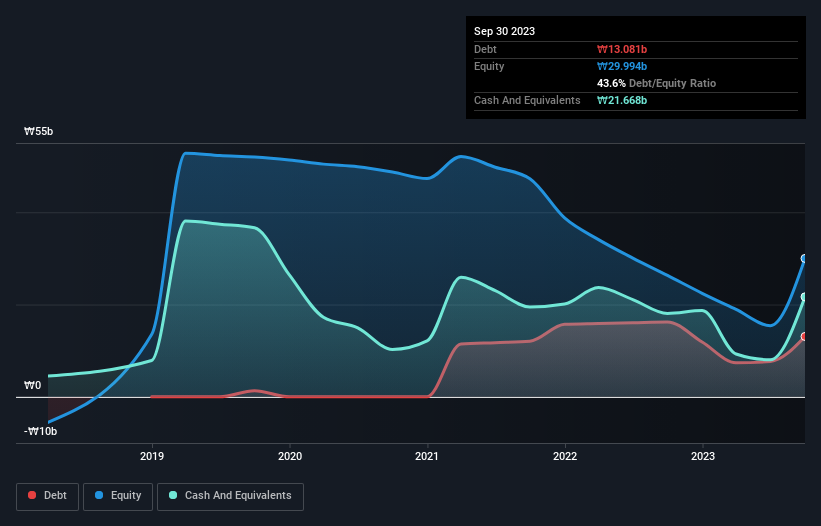
Legendary fund manager Li Lu (who Charlie Munger backed) once said, 'The biggest investment risk is not the volatility of prices, but whether you will suffer a permanent loss of capital.' When we think about how risky a company is, we always like to look at its use of debt, since debt overload can lead to ruin. As with many other companies Cellid, Co., Ltd. (KOSDAQ:299660) makes use of debt. But should shareholders be worried about its use of debt?
Why Does Debt Bring Risk?
Debt is a tool to help businesses grow, but if a business is incapable of paying off its lenders, then it exists at their mercy. Ultimately, if the company can't fulfill its legal obligations to repay debt, shareholders could walk away with nothing. However, a more common (but still painful) scenario is that it has to raise new equity capital at a low price, thus permanently diluting shareholders. Of course, the upside of debt is that it often represents cheap capital, especially when it replaces dilution in a company with the ability to reinvest at high rates of return. The first thing to do when considering how much debt a business uses is to look at its cash and debt together.
View our latest analysis for Cellid
What Is Cellid's Net Debt?
The image below, which you can click on for greater detail, shows that Cellid had debt of ₩13.1b at the end of September 2023, a reduction from ₩16.2b over a year. But on the other hand it also has ₩21.7b in cash, leading to a ₩8.59b net cash position.

A Look At Cellid's Liabilities
The latest balance sheet data shows that Cellid had liabilities of ₩12.8b due within a year, and liabilities of ₩8.45b falling due after that. On the other hand, it had cash of ₩21.7b and ₩52.9m worth of receivables due within a year. So it actually has ₩447.3m more liquid assets than total liabilities.
Having regard to Cellid's size, it seems that its liquid assets are well balanced with its total liabilities. So while it's hard to imagine that the ₩55.0b company is struggling for cash, we still think it's worth monitoring its balance sheet. Simply put, the fact that Cellid has more cash than debt is arguably a good indication that it can manage its debt safely. When analysing debt levels, the balance sheet is the obvious place to start. But it is Cellid's earnings that will influence how the balance sheet holds up in the future. So when considering debt, it's definitely worth looking at the earnings trend. Click here for an interactive snapshot.
In the last year Cellid managed to produce its first revenue as a listed company, but given the lack of profit, shareholders will no doubt be hoping to see some strong increases.
So How Risky Is Cellid?
Statistically speaking companies that lose money are riskier than those that make money. And the fact is that over the last twelve months Cellid lost money at the earnings before interest and tax (EBIT) line. And over the same period it saw negative free cash outflow of ₩16b and booked a ₩14b accounting loss. But at least it has ₩8.59b on the balance sheet to spend on growth, near-term. Even though its balance sheet seems sufficiently liquid, debt always makes us a little nervous if a company doesn't produce free cash flow regularly. The balance sheet is clearly the area to focus on when you are analysing debt. But ultimately, every company can contain risks that exist outside of the balance sheet. For example, we've discovered 4 warning signs for Cellid (2 shouldn't be ignored!) that you should be aware of before investing here.
If, after all that, you're more interested in a fast growing company with a rock-solid balance sheet, then check out our list of net cash growth stocks without delay.
New: AI Stock Screener & Alerts
Our new AI Stock Screener scans the market every day to uncover opportunities.
• Dividend Powerhouses (3%+ Yield)
• Undervalued Small Caps with Insider Buying
• High growth Tech and AI Companies
Or build your own from over 50 metrics.
Have feedback on this article? Concerned about the content? Get in touch with us directly. Alternatively, email editorial-team (at) simplywallst.com.
This article by Simply Wall St is general in nature. We provide commentary based on historical data and analyst forecasts only using an unbiased methodology and our articles are not intended to be financial advice. It does not constitute a recommendation to buy or sell any stock, and does not take account of your objectives, or your financial situation. We aim to bring you long-term focused analysis driven by fundamental data. Note that our analysis may not factor in the latest price-sensitive company announcements or qualitative material. Simply Wall St has no position in any stocks mentioned.
About KOSDAQ:A299660
Cellid
Develops immunotherapeutic vaccines for cancer and/or infectious diseases therapies.
Slight with weak fundamentals.
Market Insights
Community Narratives



